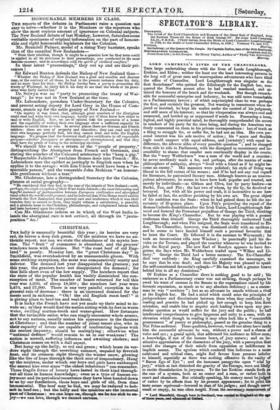HONOURABLE MEMBERS IN CLASS.
THE reports of the debates in Parliament raise a question not easy to solve—whether it is the Members or the reporters who show the most copious amount of ignorance on Colonial subjects. The New Zealand debate of last Monday, however, furnishes some veritable specimens of original information on the part of honour- able and right honourable legislators for the Colonies.
Mr. Roundel' Palmer, model of a rising Tory barrister, speaks thus of the cannibal New Zealanders-
" Bven their rebellion, though it might be a question how far that term could
be applied in all its strictness to their gs, was conducted in the moat halftone manner, and in accordance withthe spirit of civilized warfare."
In their latest "proceedings," they cut up and ate their pri- soners 1 Sir Edward Buxton defends the Bishop of New Zealand thus-
" Whether the Bishop of New Zealand was a good and sensible and discreet man, or the contrary of all those, he had in the present instance done his duty, and no more than his duty: the Bishop having been a party to promoting the away of Waitangi, he justly felt it his duty to see that the whole of its provi- sions were fairly carried out."
Dr. Selwyn was no " party to promoting the treaty of Wai- tangi": be was not in New Zealand at the time.
Mr. Laboucbere, quondam Under-Secretary for the Colonies, and present acting deputy for Lord Grey in the House of Com- mons, stands up for the sable gentry of New Zealand— "On inquiry it was found, that, although great numbers of the Aborigines could read and write their own language, hardly any of them knew how either to read or write English. Now, we are of opinion that the possession of a house and the capability of writing their own language show a sufficient capacity for business to entitle them to vote. In several places there are German and French
m settlers: these are men of p y and education • they can read and write their own language perfectly wei en but they cannot read and write the English language. We propose that the overnor shall give certificates to all respectable persons—whether foreigners or aborigines—so circumstanced, and that they shall have the power of voting in the municipal elections."
We should like to see a return of the " people of property," distinguishing the Aborigines from French and Germans, and stating the number of the Coloured aristocracy who "keep a gig." a Respectable Juliette!" exclaims Romeo done into French : Mr. Labouchere uses the epithet as jarringly to English ears when he applies it to the savage : with him Uncas would have been a "re- spectable person," and the venerable John Mohican "an honour- able gentleman without a tear."
Mr. Gladstone, late a distinguished_ Secretary for the Colonies, glances at social geography— "He considered that they had, in the case of the islands of New Zealand—with, perhaps, the single exception of their it India Islands—the most interesting and hope l instance of juxtaposition between European civilization and aboriginal races which the world could present; and he believed that if the House would exhibit towards the New Zealanders that paternal care and tenderness which it was their bounden duty to extend to them, they might witness a satisfactory, a peaceful, and a glorious issue to the Christian, philanthropic, and enlightened labour which had been bestowed upon the colony!'
Can Mr. Gladstone inform us in which of the West India is- lands the aboriginal, race is not extinct, all through its " juxta- position " &c.?

























 Previous page
Previous page